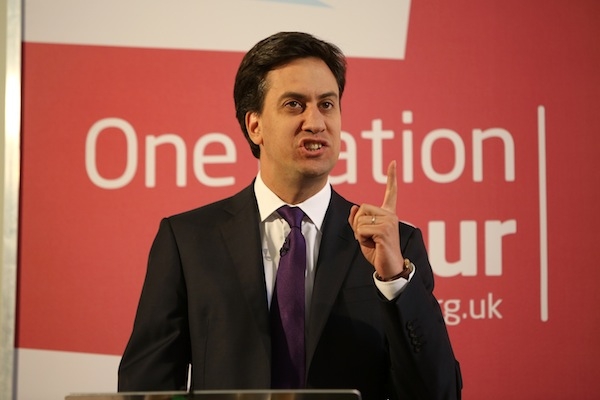Ed Miliband doesn’t take a risk unless he has to. In his first two and a half years in charge of the Labour party, he eschewed a dramatic confrontation with the trade unions. Some in his circle wanted him to take them on, as part of a broader campaign against vested interests, but they were ignored, to the relief of Tory strategists.
That has all changed now. Miliband has been pitched into an argument with the unions that will determine whether he has a chance of reaching No. 10. The Labour leader was slow to react to the controversy about the union Unite allegedly trying to fix the selection of a candidate in the safe Labour seat of Falkirk. The Tories — under Lynton Crosby’s influence, a disciplined attack machine — quickly turned the issue into a test of Miliband’s strength.
On Tuesday, Miliband attempted to turn the tables. He announced that he wanted Labour to have a direct relationship with individual union members. At present, members of affiliated unions have to opt out of paying dues to Labour; in future, Miliband said, they should have to opt in. That change is meant to show he’s putting Labour’s house in order. And if Miliband really follows through, it could be more significant than any of the party reforms that Tony Blair enacted.
But some big questions are still open. If the Labour party is to have a direct relationship with everyone who joins it via a union, why shouldn’t they be treated just like every other member? What is the justification for the unions still having their own section of the Electoral College in leadership contests and a separate voting bloc at conference?
Having resisted acting for so long, Miliband needed to be bold. And the more you look at what he’s proposing, the less decisive it looks. Those close to him argue that the party needs to see how these reforms work before deciding whether to go further. But it isn’t at all clear whether Miliband views his actions this week as the beginning of the end of the unions’ power inside Labour or simply a response to what happened in Falkirk.
Miliband did not want this situation. He doesn’t like party leaders defining -themselves against their traditional supporters, as Blair and Cameron have both done; he thinks it makes people disillusioned with politics. But now he has to deliver reforms that are already encountering union opposition. If he isn’t finished by 2015, the Tories will delight in declaring him too weak to run his own party, let alone the country.
One early indicator of whether Miliband is serious about changing the way Labour does politics is who he appoints as the party’s campaign co-ordinator. The post used to be held by Tom Watson, the personification of a machine politician, who resigned over the whole Falkirk business. Miliband’s appointment of Watson to the role two years ago undercut his claim to represent a new kind of politics. Miliband knew how Watson operated — that he was one of the Brownite hard men who had schemed to get Tony Blair out of Downing Street, and that he was close to the hard-left general secretary of Unite, Len McCluskey.
It seemed then that Miliband talked nobly about a better way of doing politics, but was happy to look the other way as his supporters did what was necessary to win. (In the Labour leadership election, the GMB union sent out ballot papers to its members in an envelope labelled ‘Vote Ed Miliband’.)
Watson’s replacement needs to offer a complete break with this way of doing politics. This should rule out Michael Dugher, a member of Watson’s team and another former Brownite operator with tribal instincts. One senior Labour figure calls him ‘Watson-lite’.
The union issue won’t go away: both coalition parties are keen to keep stoking it. Tory insiders say that they are co-ordinating more closely with the Liberal Democrats on this than they have on any other party political issue. Since the unions started demonising Nick Clegg in Sheffield, he is happy to go along with measures to curb their power.
More broadly, the coalition is in one of its more harmonious phases. Oliver Letwin, Jo Johnson and David Laws are working on a joint coalition agenda for the final 20 months of the government — both leaderships agree that they need something to keep them together as the general election nears. I understand that in the next few days senior figures from both sides of the coalition will sit down in Downing Street to determine which new policies to pursue.
One of the reasons relations at the centre remain strong is that both sides want to make sure a coalition is still possible after the next election. The Tory leadership knows that however much it might hope for a majority, being the largest party in another hung parliament is a more realistic target. So they cannot burn their bridges with the Lib Dems.
There has, though, been a change in the Westminster weather recently. Miliband is now the leader under pressure and, despite the polls pointing to a healthy Labour majority, the political class consensus is that an outright Labour victory in 2015 is unlikely.
The worry for Miliband is that he has been too cautious in his first few years as leader of the opposition, and therefore failed to establish a positive perception of himself in the public consciousness. (Cameron and George Osborne certainly think that’s what’s happened.) Miliband now has to shape an election-winning persona at just the point in the political cycle when the opposition starts to come under harsher scrutiny. He might still make it to No. 10. But his initial caution has left him with an awful lot to do.







Comments